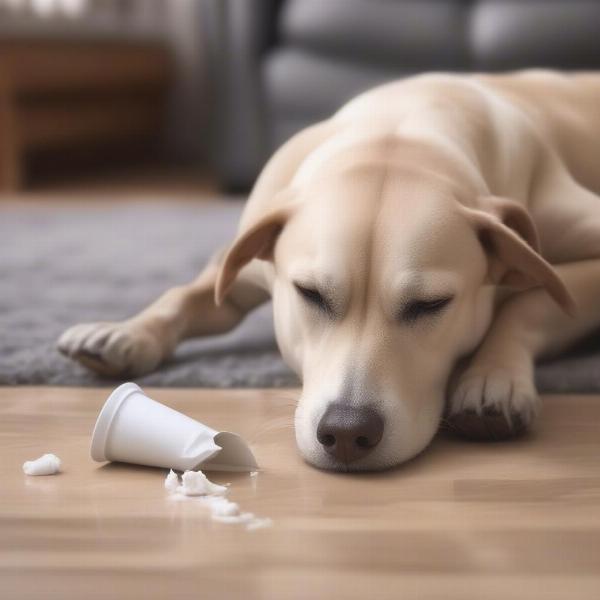Dog throwing up after neutering can be a concerning sight for any pet owner. While some vomiting can be expected after general anesthesia, it’s important to understand the difference between normal post-operative nausea and a sign of complications. This article will delve into the reasons why a dog might vomit after neutering, when it’s cause for concern, and what you can do to help your furry friend recover comfortably.
Vomiting is a common side effect of anesthesia, which is used during the neutering procedure. It can occur within the first 24 hours after surgery and is often caused by the drugs used to sedate your pet. However, excessive vomiting, vomiting that persists for more than a day, or vomiting accompanied by other symptoms like lethargy, loss of appetite, or diarrhea, could indicate a more serious issue. Understanding the potential causes can help you differentiate between normal post-operative nausea and something more serious.
Understanding Post-Operative Nausea in Dogs
Anesthesia can irritate a dog’s stomach lining, leading to nausea and vomiting. This is typically mild and resolves within a few hours. Additionally, some dogs experience a temporary decrease in appetite after surgery, which can contribute to an empty stomach and further exacerbate nausea.
 Dog Vomiting After Anesthesia due to Neutering
Dog Vomiting After Anesthesia due to Neutering
When is Vomiting After Neutering a Concern?
While some vomiting is expected, excessive or prolonged vomiting can be a sign of a problem. If your dog vomits more than two or three times within 24 hours of neutering, or if the vomiting persists for more than a day, contact your veterinarian immediately. Other concerning symptoms include lethargy, loss of appetite, diarrhea, bloody vomit, or pain. These signs could indicate complications like infection, allergic reactions to medication, or internal bleeding.
How to Care for Your Dog After Neutering
Following your veterinarian’s post-operative instructions is crucial for a smooth recovery. They will typically recommend withholding food and water for a few hours after surgery to allow the anesthesia to wear off and minimize the risk of vomiting. Once your dog is alert and no longer showing signs of nausea, offer small amounts of water and then gradually introduce bland, easily digestible food like boiled chicken and rice.
Managing Post-Neutering Vomiting
If your dog does vomit, ensure they have a comfortable and quiet place to rest. Clean up any vomit promptly to prevent re-ingestion and minimize unpleasant odors. Your vet may prescribe anti-nausea medication if the vomiting is persistent or severe. Never administer human medication to your dog without consulting a veterinarian.
Conclusion
Dog throwing up after neutering can be a normal side effect of anesthesia, but it’s crucial to monitor your pet for any signs of complications. By understanding the causes and knowing when to seek veterinary attention, you can help ensure your furry friend has a comfortable and safe recovery. Following your vet’s post-operative instructions and providing a supportive environment will pave the way for a healthy and happy post-neutering experience.
FAQ
- How long is it normal for a dog to vomit after neutering? Vomiting is usually confined to the first 24 hours after surgery.
- What should I feed my dog after neutering? Start with small amounts of water and then introduce bland, easily digestible food like boiled chicken and rice.
- When should I contact my vet? If vomiting is excessive, prolonged, or accompanied by other symptoms like lethargy or diarrhea.
- Can I give my dog human anti-nausea medication? No, never administer human medication to your dog without consulting a veterinarian.
- How can I make my dog comfortable after neutering? Provide a quiet, comfortable resting place and follow your vet’s post-operative instructions.
- Is it normal for my dog to have no appetite after neutering? A temporary decrease in appetite is common after surgery.
- What are the signs of infection after neutering? Lethargy, loss of appetite, swelling, redness, or discharge around the incision site, and fever.
ILM Dog is your trusted global resource for expert dog care and breeding information. We cover everything from breed selection to health and wellness, training, nutrition, grooming, and more. Whether you’re a seasoned dog owner or just starting out, ILM Dog provides reliable, practical advice to help you give your canine companion the best life possible. Discover more valuable resources and expert tips on our website. Contact us via email at [email protected] or phone at +44 20-3965-8624. ILM Dog – your partner in responsible dog ownership.